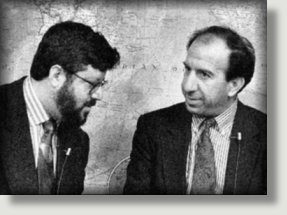Creating a culture of peace, edited by Gershon Baskin, Ph.D. and Zakaria al Qaq, Ph.D., is based on the premise that peacemaking is ultimately a collective psychotherapy.
Creating a culture of peace was born shortly after the signing of the Oslo Agreement in September 1993, during a period when there was great hope and optimism. We all shared a belief that, in fact, we were entering into an era of peace. The ideological or philosophical concept was that each people, in facing each other, would need to deal with the ideological and philosophical ethos of their own societies in order to come to full recognition and reconciliation, not only with the other society, but within their own society as well. For so many years we were bred on a philosophy and a belief in the conflict that existed between us. We developed mechanisms within our societies to justify our own position in the conflict vis-a-vis the other side. These internal philosophical embodiments of who we are as societies, we believed would also, in an era of peace, begin to lead to divisions and internal conflicts within each society while trying to cope with the other society.As the Oslo process became more and more difficult and things seemed to be breaking down, we noticed there was less and less willingness on the part of Israeli and Palestinian intellectuals to come together and talk about subjects that seemedin the light of the pressing political issues to be quite irrelevant. Even now these subjects might seem quite distant from the reality that surrounds us. Yet we thought an institution like IPCRI believes that we have to not only be responsive to political and social psychological dynamics in ours ocieties, but we also have to try to shape those in a way that we think is possible, is feasible and is necessary.
This is part of an on-going process, it is necessary to continue to challenge each other, both looking at the other side’s society and looking inward at our own society. We must continue to deal with some of the more difficult questions involved in what it takes to create a culture of peace at a time when peace does not yet exist, when the streets are filled with violence, when the challenge of the conflict still exists, when we are still, perhaps not officially but in reality, enemies. The two societies are fighting each other for existential national symbols, and in some sense even over life and death.
It is quite a considerable challenge to ask how do we influence, mold, create, lead our own societies to create a culture where our children, the next generation of Israelis and Palestinians, will really be able to live in peace. How can we play a role in paving that road so the challenges that will face the next generation will be smoother and easier than the ones we face today.
To start in the Israeli and Palestinian societies a process of reflection on how peace between our two nations is going to affect the way we view ourselves, the other side, and our relationship: from mutual denial through recognition to reconciliation.
To foster among both peoples values and habits of tolerance, listening, empathy, and an openness to reassess our own assumptions.
This includes: Reassessing the conflict’s conflicting history or histories;
Reassessing the “enemy image” as broadcast through the media, education, etc.;
Reassessing the continued structural israeli-palestinian inequality (in military power, economic resources, technological base, degree of international linkaging, etc.) and structural violence, which may provoke a renewal of violent national/community conflict in future.
Through sustained creative effort to develop and disseminate common visions, values and ideals: in the short run, these should help prevent a relapse in violent conflict; in the medium term, they can form a basis for peaceful coexistence; and in the long run, they may inspire further-reaching integration between both nations.
The basic premiss of the project is that peacemaking is ultimately a collective psychotherapy. The Israeli-Palestinian peace process can start with political agreements between the political leaderships, and it must be underpinned by economic links and interests. Real peace can only be made and consolidated by a transformation on the cultural-ideological level, through a people-to-people change of heart: from trauma, fear, and anger – to healing, forgiveness and reciprocal acceptance.
It should be noted that the opinions expressed in this book are those of the authors and speakers and do not necessarily reflect the opinions and positions of IPCRI. We do encourage dialogue and debate amongst people with differing opinions and we tried to give expression to that within this book as well.



